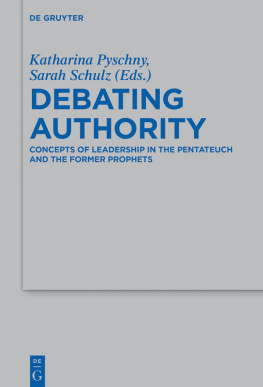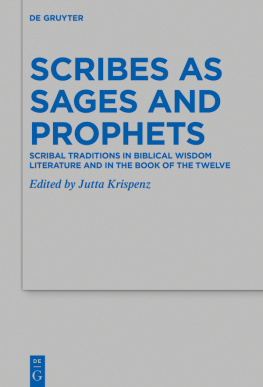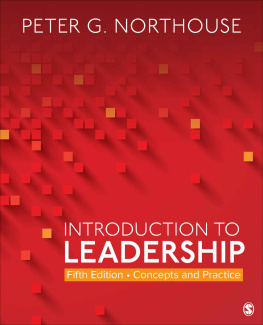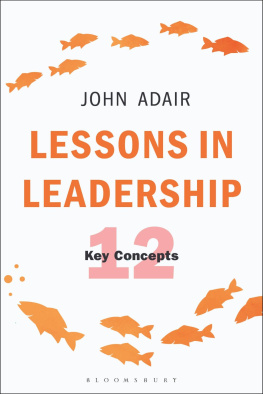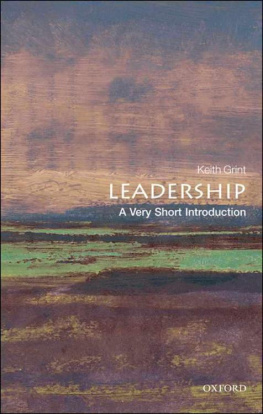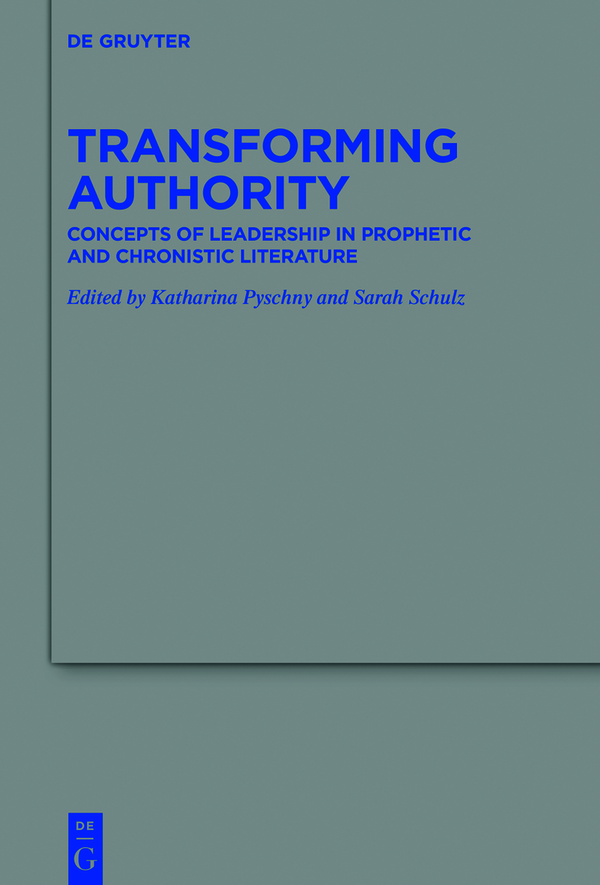Reinhard G. Kratz
The Deutsche Nationalbibliothek lists this publication in the Deutsche Nationalbibliografie; detailed bibliographic data are available on the Internet at http://dnb.dnb.de.
Introduction
Prof. Dr. Katharina Pyschny
Humboldt-University of Berlin, Berlin, Germany
Dr. Sarah Schulz
Friedrich-Alexander-Universitt Erlangen-Nuremberg, Erlangen, Germany
Throughout its literary scope, the Hebrew Bible offers a wide variety of different and sometimes even contradictory concepts of leadership. Various aspects of leadership are present not only on a superficial level but are deeply embedded in the structure of the biblical texts and their redactional history. Leadership can certainly be considered a cross-cutting issue within the Hebrew Bible, still in need of further research.
Our first volume on leadership shed light on the variety and diversity of concepts of leadership within the Pentateuch and the Former Prophets highlighting as well the literary dynamics and discursivity coinciding with these concepts and ideas. In comparison to other biblical texts, this phenomenon, i.e. the way in which the Pentateuch and the Former Prophets first constitute various concepts of leadership and then negotiate and debate them in regard to their authority, is a special feature of these literary corpora, as was hinted at by the title Debating Authority. Even though these corpora also reflect the notion of reshaping and reinterpreting leadership concepts (e.g., the transformation of leadership and authority in the case of Moses successor Joshua), it is not the most decisive tendency there.
The present volume, Transforming Authority, focuses instead on biblical literature in which the notion of transforming leadership concepts is (more) characteristic: namely, prophetic and chronistic literature. The aspect of transformation can be understood on two levels: The volume deals with texts that not only reshape, reinterpret and transform traditional concepts of leadership on a literary level, but which also stem predominately from the postexilic period, a transformed time characterized by many social changes.
Aspects of Definition and Methodology
This volume is based on a rather broad or open understanding of leadership, which allows for analyzing the biblical concepts in their variety, complexity, and fluidity. Leadership is understood as the power or ability to direct the actions of individuals or groups. This direction is conducted via (social) interaction(s) and is always goal-oriented. Leadership constitutes asymmetrical social relations of super- and subordination, which are not simple, unidirectional relationships such as between leaders and their subordinates, but include several reciprocal dynamics. It is important to note that these asymmetrical social relations are not necessarily totalitarian in nature. Leadership claims can be restricted to specific areas, depending on the leaders competence and authority. Leadership is not necessarily institutionalized, but it always has a public character or impact. The stabilization or routinization of specific leadership claims, though, is often linked to processes of institutionalization. Every kind of leadership has at least one basis of legitimation, which can differ in concept and style. This is already evident from the typology of leadership established by Max Weber: legitimation via law, legitimation via tradition, and legitimation via charisma. In order to speak of legitimate leadership, the authority of the leader must be acknowledged at some point by his or her subordinates, at least to a certain degree.
In regard to the identification of concepts of leadership in the Hebrew Bible, the present volume takes into account not only lexical and semantic issues but also given the almost complete lack of abstract terms for leadership, authority, office, etc. in Biblical Hebrew narrative constellations and structural analogies.
Thus, as far as methodology is concerned, the contributions follow a wide range of approaches and seek to combine synchronic, diachronic, and sociological perspectives in a methodologically critical and conscious way. The volume intentionally does not concentrate on one specific concept of leadership, but seeks to group various concepts together and to contextualize them in terms of their synchronic scope or compositional structure, theological content, literary-historical background, and historical contexts. At the same time, the various concepts of leadership will be compared in order to shed new light on the leadership discourses in and behind the biblical texts. Given that biblical texts seek to be read as construed history, various concepts of leadership will be analyzed with regard to their theological perspectives on the one hand and their historical and socio-political contexts on the other. Taking into account the highly complex and reciprocal relationship between history and text, the biblical leadership claims are understood primarily as fictive or ideological in character. They can be assumed to have points of contact with the actual history of ancient Israel but are not taken as its one-to-one-reflection. However, even the most fictive authority or leadership claim has some kind of historical context and an actual (perhaps even de facto failed) agenda, which can only be explored by looking both at and behind the texts.
Leadership in Selected Prophetic Literature
The present volume deals with only a small selection of biblical texts and their respective concepts of leadership. Within the rather large corpus of prophetic texts, the essays here focus on the book of Jeremiah on the one hand and the books of Haggai and Zechariah on the other. Based on these selected case studies, the volume seeks to provide insights into various issues of leadership in prophetic literature. They are by no means comprehensive but rather aim to open up new perspectives and encourage further research.
The Book of Jeremiah
The book of Jeremiah is particularly interesting and challenging for this endeavor. This is due to the fact that aspects of leadership, legitimacy, authority, etc. are dealt with more or less explicitly throughout the whole book. They play a significant role on various levels of analysis:
On the literary-synchronic level, the book of Jeremiah constructs various types of human leadership, including prophetic, priestly, Levitical, and royal leadership. Of course, not every form of leadership is given the same amount of attention. The conceptualization of these types of leadership differs in terms of definition, In light of the various differences between the Hebrew and the Greek text, it is obvious that the issue of leadership could be also approached from the perspective of textual history. Regardless of how exactly the textual evidence is explained, there can be no doubt that significant textual phenomena or developments concern claims of leadership, legitimacy, and authority (see J. Erzberger). In addition, the books textual (and literary) history is not totally independent from the evolving culture of writing in Israel. The textual (and literary) processes linked to the formation of the book as well as the ways it reflects on literacy and the nature of scripture were without doubt also influenced by aspects of leadership (see


